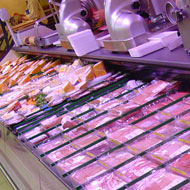Scientists develop alternative test for horse meat

The horse meat scandal of 2013 was sparked by the discovery of horse meat in a number of supermarket meat products.
A cheaper alternative to DNA testing as a means of distinguishing horse meat from beef, has been developed by scientists at the Institute of Food Research.
Because horses and cattle have different digestive systems, the fat components of the two meats have different fatty compositions. The new method looks at the differences in the chemical composition of the fat in the meats, using similar technology to a hospital MRI scanner.
In just 10 minutes, a technician can determine whether a piece of raw meat is horse or beef.
The method was recently trialled in an industrial setting by a leading meat processor. It is currently being extended by the team of scientists to test for other meat species, including pork and lamb.
The current favoured method of testing meat relies on DNA, which can tell one meat from another based on the genetic makeup of the source animals, but is relatively slow, expensive and prone to contamination if not used carefully.
Commenting on the new technology, Dr Kate Kemsley said: "It's a stroke of luck really that some of the most important meats turn out to have fat signatures that we can tell apart so easily with this method. It's been very satisfying to see results from a real industrial setting sit right on top of those we generated in our two labs. We think this testing method should work well at key points in the supply chain, say at meat wholesalers and processors."
'Authentication of beef versus horse meat using 60 MHz 1H NMR spectroscopy' is published in Food Chemistry.



 The latest
The latest